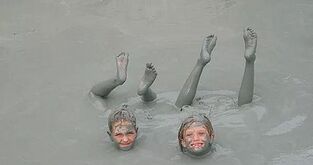
Psoriasis is one of the most misunderstood diseases. Neither the causes of the disease nor the treatment are known. It is believed that complete recovery from psoriasis is not possible, so the main goal of therapy is to achieve a stable long-term remission and reduce the frequency of exacerbations. Because the disease requires adjustment of diet, lifestyle, systematic use of medications and non-pharmacological substances, psoriasis is mainly treated at home.
Causes and symptoms of psoriasis
Psoriasis is a chronic pathology with a recurrent course. The disease can affect various organs and tissues, but the main manifestations of psoriasis are dermatological. Red lesions appear on the skin that tend to grow and coalesce. The surfaces are covered with gray scales and are easily broken, showing wet shiny spots with "bloody raw" spots underneath.
The most common sites of psoriatic plaque localization are the knees and elbows, scalp, the area behind the ears, and the back. The rash is accompanied by itching, tightness and discomfort in the most affected areas.
The appearance of psoriasis is associated with stress, a recent infectious disease, allergies, endocrine pathologies, but according to many experts, it is a genetic defect. Any of the above factors is just a "trigger" that triggers the body's abnormal reaction mechanism to external stimuli.
Failure disrupts the division of epidermal cells. The rate of surface cell death and desquamation is 4-5 times higher than in the normal period. As a result, the scales, which do not have time to peel, form hard growths - plaques.
Rules of psoriasis treatment at home
The treatment of psoriasis covers two areas:
- symptomatic- removal of acute symptoms of the disease (foreign substances, antihistamines, physiotherapy);
- pathogenetic:diet, body sensitization, cleansing measures, hormone therapy, etc.
In severe cases, treatment is provided in an inpatient setting, it is possible to use serious hormonal drugs and basic therapy. The rest of the time, the patient fights the disease alone, choosing the most effective methods through trial and error.
Psoriasis is a disease that does not have a suitable solution for everyone. What suits one patient can aggravate another. It requires a more individual approach than ever before, but the general principles must be followed to successfully treat psoriasis at home:
- Listen to your body. No one but you can identify all the factors that cause psoriasis to worsen and find medications that will work well on your tablets.
- Self-medication under the supervision of a dermatologist is desirable. Do not give up tests, procedures and medications prescribed by a specialist.
- With a mild form of psoriasis, good results can be achieved by eliminating the irritants and using non-drug treatments, including folk remedies. If the manifestations of the disease are very obvious and the psoriasis is progressing, a "heavy artillery" in the form of hormones and cytostatics may be required according to the doctor's prescription.
- Consistency and regularity are important in the treatment of psoriasis. You can't stop using effective tools when the first results appear. Most drugs require a therapeutic course first, then a long course - "fixation".
- It is important to maintain normal skin moisture, avoid scratches, trauma and inaccurate peeling. The boards are cleaned only after pre-softening and can be done only without effort.
- Many treatments cannot be used in the acute phase. Insulation, climate change, spa procedures, some ointments should be applied only at the beginning of the dormant phase.
Treatment of psoriasis: how are plaques stained?
The most popular and effective treatment for psoriasis on the skin are pharmaceutical ointments and creams. Many topical medications have serious side effects and should be used with caution. This is especially true for hormonal ointments, but in non-hormonal matters it is better to consult a doctor and strictly follow the recommendations for use.
Hormonal ointments
Hormonal agents in the treatment of psoriasis are indicated for persistent skin symptoms that do not respond to other therapeutic effects. The benefits of these drugs are rapid. The patient's condition is literally improving before our eyes, but this effect is deceptive. After stopping use, the boards not only return, but also become tighter. Hormonal ointments are addictive and when used for a long time - damage to the kidneys, liver, cardiovascular system, thinning and atrophy of the skin. There is also a fear that hormone-based medications "drive" psoriasis into the body, and the disease manifests itself in a more severe form - psoriatic arthritis.
Addiction and withdrawal effects make hormonal ointments an undesirable treatment. If possible, it is recommended not to use. If necessary, use for a short time, gradually cancel.
Today, several groups of drugs are prescribed for the treatment of psoriasis:
- Triamcinolone ointments.Antihistamines have anti-pruritic and anti-inflammatory effects. May cause local reactions, changes in skin structure, atrophy.
- Products containing the active ingredient flumetazone.Reduces itching, exudative effect. Adversely affects the skin, can lead to systemic diseases over time.
- Hydrocortisone ointments.Reduces capillary permeability, eliminates swelling of the affected foci, but with long-term use, systemic disorders occur.
- Betamethasone-based drugs.Has anti-inflammatory and exudative effects. Suppress the accelerated desquamation of epithelial cells. Skin disorders and system problems are possible.
Non-steroidal anti-inflammatory drugs
Non-hormonal ointments are the preferred treatment for psoriasis. Hormones do not act as fast and strong, but the effect is more lasting and lasting. Non-steroidal ointments can be used for a long time without fear of addiction and negative consequences.
In psoriasis, drugs with different compositions and different effects are used, many of which are combined with each other. The main groups of applied ointments:
- salicylic.The acid inside softens the plaque and helps cleanse the skin. Reduces inflammation, plays an antiseptic role. Medications are usually prescribed to remove the scales and then the affected area is treated with another drug containing the drug.
- Zinc.Eliminate dry rashes, inflammation and irritation of the skin, create a protective film that prevents adverse effects from the outside on the affected areas.
- tar.Ointments with birch, candle, charcoal resin have anti-inflammatory and disinfectant effects. They stimulate blood circulation and improve the healing of damaged skin. You can add pure resin when you prepare your medication to remove plaque. Resin ointments are poorly tolerated, so they begin to rub into small areas in test mode. Dosage is increased with good tolerance. Tar increases the sensitivity of the skin to light, which can cause sun allergies in summer.
- D fortified ointments.Calcipotriol-based drugs have proven to be effective in the treatment of psoriasis. Suppresses congestion, reduces plaque & prevents recurrenceThey do not cause atrophic processes. If there is an effect, provide a stable remission. Recommended for use in tandem with UV therapy; Contraindicated in combination with salicylic ointments.
- Oil-based ointments.Exfoliate plaque, relieve itching and inflammation, but requires careful use. With increased sensitivity, psoriasis, furunculosis can lead to worsening of skin manifestations. These funds are contraindicated in patients with anemia, kidney disease. Treatment with these drugs is carried out outside the stage of exacerbation.
- Vitamin products.Vitamin ointments activate metabolic processes in the skin, restore tissue trophism, promote renewal, eliminate peeling, slow down keratinization of cells. Preparations based on a tandem of retinoids and vitamins E and A have these properties.
- Solid ointments.Active substances with anti-inflammatory, keratolytic, antipruritic effect. Penetrate deep into the skin and normalize metabolic processes inside. It is used for a long time in the absence of allergies. These ointments cannot be combined with hormonal ointments and alcohol should be avoided during treatment.
Psoriasis: Internal Treatment
It is difficult to solve the manifestations of psoriasis only with foreign agents. It is also necessary to act from the inside: to sensitize, to improve digestion.
- In an exacerbation, antihistamines have been shown to help reduce itching and counteract the effects of irritants. In addition to the antiallergic effect, the drug has a sedative effect.
- Detoxification of the body is carried out with the help of sorbents.
- It is recommended to use enzymes to improve digestion.
- Liver support is important in psoriasis: hepatoprotectors are taken.
- "Psoriasis" should be calm. Stress is one of the factors that trigger psoriasis. The disease itself, in turn, can lead to neurological problems: nervousness, insomnia, etc. Herbal sedatives are recommended.
- NSAIDs can help relieve joint pain in psoriasis.
The appearance of an infection focus in the body can lead to exacerbation of psoriasis. Acute infectious and inflammatory diseases should be treated with antibiotics as prescribed by your doctor.
How to treat psoriasis at home: features
ICH is the most troubling for psoriasis patients. It is more difficult to treat than exposed skin, because the presence of hair requires a special approach to therapy and the use of special tools.
The first treatment for psoriasis at home is the use of shampoos, medications and traditional methods. Skin lesions can be either mild, in the form of separate spots, or severe. In difficult cases, the head is covered with a "low" or "helmet" - a hard, itchy and crusty psoriatic scab, mainly along the border of hair growth on the forehead, behind the ears, neck.
Under no circumstances should you scan or "select" dry shells. A special keratolytic shampoo should be softened with a cleansing mask and then the loose scales on the skin should be gently cleansed.
Wash your hair often for psoriasis if necessary. It is preferable to use special or neutral shampoos. The second group includes products for children and adults for sensitive skin. Free of fragrances, dyes & other harmful substances
You can use medicated shampoos:
- tar.These products contain charcoal resin, which gives a dark color and a distinctive odor. These shampoos are not well tolerated, so a test is needed. Medicinal cosmetics are sold in pharmacies.
- Zinc.Contains zinc pyrithione, which removes dead scales, reduces itching. When allantoin, an emollient, is added to the shampoo, it helps reduce dry skin and heals damage faster. Some remedies are designed to treat dandruff, but can be used for milder psoriasis.
- against fungi.Ketoconazole shampoos reduce swelling and itching and eliminate fungal infections of the scalp.
In psoriasis, it is recommended not to wash the shampoo immediately, but to keep it for a few minutes to a few hours to allow the medication to penetrate deeper. The scalp should be washed gently without scratching. After washing the shampoo thoroughly, rinse with cool water acidified with vinegar. Avoid using a hair dryer.
Ordinary ointments are not suitable for lubricating the plaque on the head. They are very oily, sticky hair and do not wash well. It is better to take the drug in the form of creams, lotions, emulsions or aerosols - many manufacturers produce their products in a form suitable for the treatment of ICH psoriasis.

Treatment of psoriasis at home is successfully carried out with the help of folk remedies: masks and rinses.
Popular definitions:
- To soften the scalp, rub the oil mixture on the scalp: essential (olive, burdock and essential) (tea tree, rosemary, cypress), put on a hat and leave until the morning; Make a paste of white or red clay by adding
- oils and apply it on your head overnight;
- Rub fresh onion juice on the skin;
- When the nettle, wash with a mixture of chamomile;
- Mix grape, almond and coconut oil in a ratio of 1: 1: 2 (in the form of a tablespoon), add 1 tsp. cognac and honey, a few drops of lavender oil, mix well in a water bath, apply on your head for 2 hours;
- Exfoliate the scalp with essential oil (eucalyptus, tea tree) and sea salt - rub and massage gently with your fingertips for 5 minutes, then wash your hair;
- Prepare a mask: burdock oil, 2 yolks, alcohol tincture of marigolds, a few drops of resin and keep for 2 - 3 hours at the beginning.
Home Treatment for Nail Psoriasis
Psoriasis nails become brittle, wavy and change color when exposed. These nails must be protected from external influences:
- do homework by hand;
- to give up trim manicure;
- Cut short nails after immersion in water;
- Use protective therapeutic varnish.
Home treatment for psoriasis includes:
- Intake of vitamin (C, E, calcium) vitamin and mineral complexes that strengthen the nail plate and protect cell membranes from damage.
- Hormonal ointments are the most effective for nail treatment. Glucocorticosteroids do not penetrate the skin and do not penetrate the bloodstream when rubbed on the nail plate, so their use is safe for 2 to 4 weeks.
- To strengthen and moisturize nails, apply sea buckthorn oil (3 times a day) and vitamin A oil daily.
- To whiten and strengthen nail plates, it is recommended to soak in hot baths with corn starch or oat flour, strawberries, nettles, rope.
Home treatment for psoriasis

Herbal infusions are one of the most popular home remedies for psoriasis:
- Infuse 1 tablespoon in a thermos overnight. l. flax seeds (in a glass of water). Drink 2 tablets of activated carbon before bedtime, take the infusion in the morning, eat seeds. This recipe helps to detoxify the body, helps to reduce the intensity of the symptoms of the disease.
- Broth from the collection: elecampane (10 gr. ), calamus (12 gr. ), St. John's wort (15 gr. ) and celandine (5 gr. ). Infuse 300 ml of hot water in a thermos, leave for 3 hours. Strain, take 100 ml 2 times a day.
- 4 st. l. Boil the seeds in a liter of water for 60 minutes in slow water. Strain in a spoon every hour with exacerbation, and for 4 times a day - in remission.
- Birch mushroom (100 gr. ) Infuse with warm water overnight. In the morning, grind the chicken and pour the remaining water, heated to 50 degrees, leave for three days. Strain, take 100 ml before each meal.
Effectively removes plaque from the skin, eliminates itching and soothes baths:
- sage, string, celandine, St. John's wort;
- with sea salt;
- with blue clay;
- with baking soda
- with potato starch;
- with turpentine.
Take a shower before the bath, then pour water at a comfortable temperature (not hot), dilute the drug. Bath time - 15-20 minutes, of course - every day.
You can use fresh celandine juice to lubricate the boards or make an ointment: mix the ground grass with petroleum jelly or baby cream.
Well-proven butter cream with propolis (1 part) (5 parts). Put in a water bath, mix thoroughly and cool. Lubricate the board with hydrogen peroxide before use.
Diet for psoriasis
Psoriasis is often associated with food allergies. Many patients know exactly which foods cause deterioration. Others believe that nutrition does not significantly affect their condition. In any case, it is recommended that you keep a diet at least during exacerbations:

- Exclude cocoa, chocolate;
- Refuse coffee;
- Don't eat spicy food;
- Avoid preservatives and other additives;
- Limit citrus fruits, red vegetables and fruits;
- Completely prohibited alcohol (especially beer).
Outside of aggravation, the diet can be expanded with "harmful" products, while carefully watching the reaction of the skin.
Long-term remission can be achieved through diet, a healthy lifestyle and home treatment for psoriasis. However, if folk remedies do not clearly help, you should "surrender" to a dermatologist and not give up the procedures and medications offered. It will be easier to deal with relapse prevention after eliminating the exacerbation with official medication at home.























